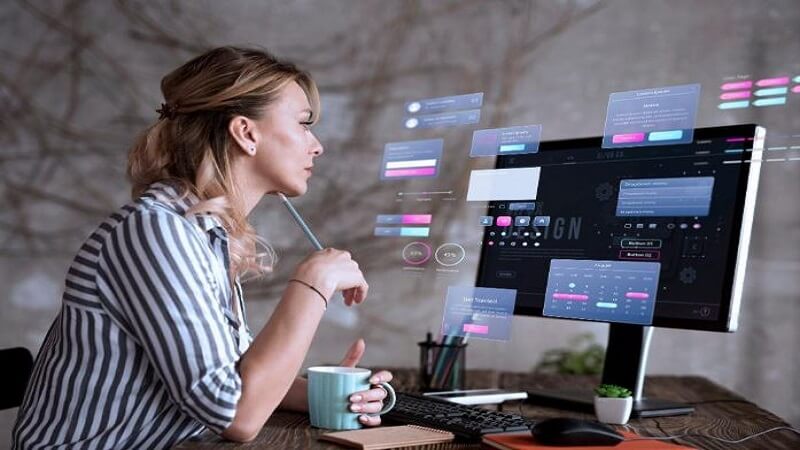On average, people spend 8 hours working on the computer daily. Health reports show that increased screen time increases the possibility of eye strain. It may cause eye disorders such as myopia and dry eye. Experts consider over two hours of screen time daily excessive. It may cause short-term problems such as blurred vision, eyestrain, and headaches.
Limiting your time on computers and phones can limit these effects. It improves your overall health and mental health. Limit the light on your screens and take breaks. Wear protective glasses to reduce the impact of the blue light.
How computer monitors affect the eyes
Computer light can have significant effects on your eyes. The effects can be caused by the time you spend on the screen. It also depends on the amount of light on your screen. Some people sit too close to their computer which can also accelerate the effects. Avoid fixing your eyes while watching something or working on a project for more hours.
Your computer screen brightness has an impact on your eyes. You might strain to see when the brightness is too low or high. The Mac display brightness is set to adjust depending on what you are viewing. It brightens more when watching videos. If you need screen brightness control, you must do it manually. Manual control lets me brighten my screen to the level I want. You can do this using the F1 and F2 keys. F1 dims the screen while F2 brightens it. Dim your screen or brighten it to the level your eyes will feel comfortable. Your eyes could suffer the following problems due to extended screen time.
- Eye dryness. Research shows people rarely blink when on their computers. As a result, their eyes dry out quickly. The person feels stiffness in the eyes due to lack of moisture.
- Blurred vision. Blurred vision happens because your eyes get used to short-distance focus. You may develop short-sightedness. You begin to see blurred-distance objects.
- Eye fatigue. Eye fatigue happens when your eye muscles focus on a single point for more hours.
- Headaches. Headaches come due to eye fatigue. The strained muscles may trigger migraines.
- Retinal cell damage. Consistent exposure to blue light may damage your retinal muscles. Your muscles may degenerate fast which can cause cataracts and eye cancer.
Methods to protect eyes from computer screen
Screen time is the total time spent on a computer or phone daily. The amount of time spent determines the level of effect on your eyes. Take the following steps to protect yourself from the effects.
Minimize screen time by taking breaks
You may not avoid spending less time on the computer due to your nature of work. However, you can minimize the time by taking breaks. Experts recommend taking shorter breaks often instead of one long break. You may take 10 minutes per hour or 20 minutes every two hours. It will prevent your eyes staring consistently on the screen which can affect them.
Use a computer screen protector
A computer screen cover blocks direct light from reaching your eyes. This light is what causes eye strain which might lead to migraines. The protector is made from special materials which filter out computer blue light. It helps prevent red eye, irritation, and blurred vision effects.
Wear anti-glare glasses
The blue light screen for computers significantly affects your eyes. Anti-reflective glasses contain metal oxides. These minimize the glare and reflections on the glasses. The glasses improve your vision in bright light. It minimizes fatigue, eyestrain, and the effects of blue light.
Turn on the eye saver mode
Modern computer screens feature the eye saver mode technology. Its goal is to minimize eye strain and boost your eye comfort. Once you turn it on, you will see a yellow tinge. This fades away immediately after your eyes adjust.
The blue light on screen for the computer makes your brain think it is daytime even at night. Due to this, the brain fails to trigger the body to sleep at night. This can cause serious eye strain. The screen saver mode turns off the blue light effect.
Blink more and adjust the light
Blinking helps to keep your eyes wet and avoid the dry eye effect. The coat of tears in your eyes sharpens your vision. It brightens the images your retina receives. Blinking nourishes the eyes with oxygen. It keeps your eyes healthy and comfortable.
Adjust the light to avoid too much light. The light in the room should also be balanced. Use natural light during the day and balance lighting at night. Brighter bulbs in the room can affect your eyes like a computer monitor does.
Keep your distance and do eye checks often
Avoid being too close to your computer monitor. The light reaching your eyes from the screen will be too high. Its effects are higher than when you keep your distance. Stay about 25 inches away from your screen. Visit your eye doctor for checkups. Your doctor can identify any developing problems and help you prevent them.
Conclusion
People nowadays spend more time on their computers. This damages the eyes although the impact might not be immediate. Your eyes may turn red and your retina cells could get damaged. Your eyes may feel irritated, become dry, or get blurred vision. Protect your eyes by minimizing the light on your screen. Use a screen protector and anti-glare glasses. Blink more and upgrade your monitor to the latest technology.
